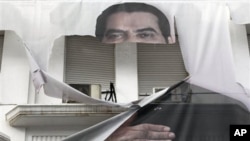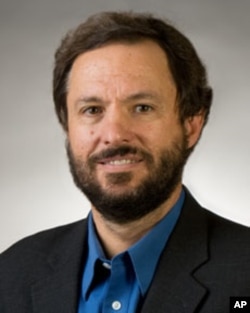It is unprecedented in the Arab world and the seeming answer to a U.S. prayer - youth, rising up against a dictator and toppling the government in the span of a few short weeks. This happened in Tunisia as U.S. Secretary of State Hillary Clinton was in the region to advance political, economic, and social reform across the region. Some critics have been asking why the U.S. did not seize the moment and offer stronger support to the Tunisians?
Stephen Zunes, a professor of politics and chairman of Middle East Studies at the University of San Francisco, says he believes the United States may have missed an opportunity.
|
VOA's Cecily Hilleary speaks with Stephen Zunes:
|
Zunes: I think the main problem is that there has long been a double standard, under both Republican and Democratic (U.S.) administrations, of looking the other way when the dictatorship happens to be a U.S. ally; that while we gave certain moral support to uprisings such as in Burma and Iran in recent years and even a limited amount of financial support to opposition groups in countries like Serbia and Ukraine.
When it comes to authoritarian regimes that have historically been allied to the United States, such as Tunisia, concern about human rights has tended to take second place to various economic and strategic concerns.
Hilleary: What is the U.S. rationale here?
Zunes: I think in many ways, it’s classic realpolitik. But in the Middle East, of course, there’s particular concern about radical Islamist groups that have challenged pro-Western regimes. In the case of Tunisia, where the hardline Islamists are probably weaker than in almost any other Arab country, this rationalization seems particular thin.
Hilleary: So you’re saying that because Tunisia is a secular society, the United States was happy with the status quo. Is it that simple?
Zunes: Not just secular, but of course pro-Western. They had generally cooperated with the United States in the so-called war on terror. They had generally followed the dictates of the International Monetary Fund in terms of structural adjustment and other economic policies, along with a neo-liberal consensus.
And while there were some concerns about the level of corruption and some human rights matters, they were not taken seriously enough to alter generally good relations. In fact, Tunisia was one of only five countries - the others being Israel, Egypt, Jordan and Columbia - that received direct U.S. security assistance through the regular Foreign Appropriations Bill.
Hilleary: Last week, while she was in Qatar, Secretary of State Hillary Clinton told Al Arabiya Television that the U.S. would not be taking sides in the escalating Tunisian conflict. Critics accuse the U.S. of being “tone deaf,” of dropping the ball. President Obama came out last week praising what he called the “courage” and “bravery” of the activists in Tunisia. Was his statement, in your opinion, strong enough?
Zunes: It may be too little, too late in certain ways. But at the same time, what’s significant about this transition in U.S. policy just in the past week, is there’s long been a sense of fatalism in the Arab world - that they are simply victims of outside forces.
And the shift in U.S. policy from supporting the Tunisian dictatorship to supporting the pro-Democracy forces, I think it sends an important message: That rather than Washington’s policies controlling events impacting the Arab street, the Arab street has impacted Washington’s policy.





